Coalition Defends Solar for All
Air Date: Week of October 17, 2025
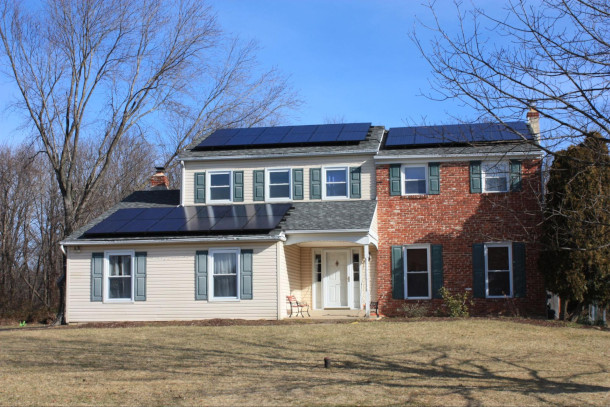
The $7 billion Solar for All Program, implemented by the Biden administration, was created to increase access to solar energy for low-income households and communities across the United States. (Photo: Montgomery County Planning Commission, Flickr, CC BY-NC-SA 2.0)
Facing lost jobs and higher energy prices after the Trump EPA canceled $7 billion in low-income solar grants, a coalition of labor, green and anti-poverty groups is teaming up to fight in court for clean energy jobs and save “Solar for All.” Patrick Crowley, President of the Rhode Island AFL-CIO, and Kate Sinding Daly, Senior Vice President for Law and Policy at the Conservation Law Foundation, join Host Steve Curwood to explain the impact of the canceled grants and the legal basis for their lawsuit.
Transcript
DOERING: From PRX and the Jennifer and Ted Stanley studios at the University of Massachusetts Boston, this is Living on Earth. I’m Jenni Doering.
CURWOOD: And I'm Steve Curwood.
In May when the Trump EPA canceled a $20 million grant to the remote Alaskan village of Kipnuk, the town sued, saying the funds were "essential to prevent environmental and cultural catastrophe." But on October 12, before the courts had acted, catastrophe struck Kipnuk as erosion and melting permafrost linked to climate change led to massive and fatal flooding from the remnants of a typhoon in Asia. This is just one of more than 600 climate grants for disadvantaged communities canceled so far by the Trump White House, including the $7 billion Solar for All program. Facing lost jobs and economic disaster, a coalition of unions, antipoverty and green groups led by the Rhode Island AFL-CIO went to court to fight back.
CURWOOD: On the line now from Cranston, Rhode Island, is Patrick Crowley. He's the President of the Rhode Island AFL-CIO, a federation of labor unions in the state. Welcome to Living on Earth, Patrick!
CROWLEY: Thank you, Steve. It's a pleasure to be here.
CURWOOD: So tell me, what was the Solar for All program? What kinds of projects and programs was this money going to fund?
CROWLEY: Solar for All was a unique program that was initiated under the Biden administration that would have provided solar power to disadvantaged communities, and in a place like Rhode Island, it would have been hundreds, if not thousands, of homeowners were going to be able to put solar on their houses without having to negotiate some pretty steep upfront costs. We would have gotten $49.3 million out of a $7 billion total package, and it was going to put hundreds of my members to work, but also it was going to reduce the cost of electricity across the entire state of Rhode Island. Rhode Island does not produce any of its own electricity. We have to import it all. So by having a Solar for All program, we would have had access to some really good, cheap, reliable power.
CURWOOD: So what are the economic consequences then, of canceling this funding, both in your state and in the United States?
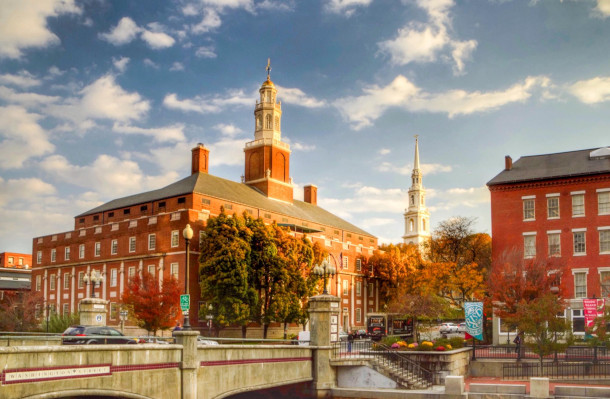
Rhode Island imports all of its electricity. (Photo: Dennis Weeks, Flickr, CC BY 4.0)
CROWLEY: Well, the immediate consequence is we're going to see electricity bills continue to rise. You know, by not having that solar program in place, it's going to mean that we're going to get our electricity from legacy fossil fuel developers, all of which are subject to extreme market fluctuations, depending on what's going on on Wall Street or what's going on in international affairs. So that's problem number one. Problem number two is thousands of job opportunities just evaporated overnight. And one of the things, Steve, that we talk about here in Rhode Island, Rhode Island is a blue-collar, working-class labor state, but the average age of a construction worker is 55 years old in our communities, and the new generation of construction workers don't look like the guys that are there now. They're brown, black and female, and what the Solar for All program was going to do was require the utilization of apprentices, which meant that we were going to also train the next generation of construction workers while we were creating new jobs and saving money for homeowners.
CURWOOD: So if you step back from Rhode Island for a moment, how big a deal is this for the United States, do you think, for places like yours, or maybe even a little different than yours?
CROWLEY: I think it's a huge deal. I mean, 900,000 American households have lost the opportunity to put affordable solar. There's indigenous tribes that have never had their own electricity supply that are impacted. It's poor people that live across the entire country that wanted to do the right thing but didn't have the access to financing in order to get solar installed. All of that has gone up in smoke right now. That's one of the reasons why my organization decided to join into this lawsuit.
CURWOOD: And what about community solar? Wasn't this supposed to fund community solar so even if you didn't have a roof or a building you just rented, you could buy into such solar?
CROWLEY: Exactly. I mean, it's one of the new developments within this marketplace that's pretty exciting. Not everyone's going to be able to put a solar panel on their roof, but it doesn't mean that we can't access solar power. So whether it's community solar, ground-based solar, it's all work that my members do and are still looking forward to doing, but also places where we can really make a dent in our carbon footprint.
CURWOOD: So tell me the story of a community or individual that stands out for you when thinking about the impact that Solar for All could have had.
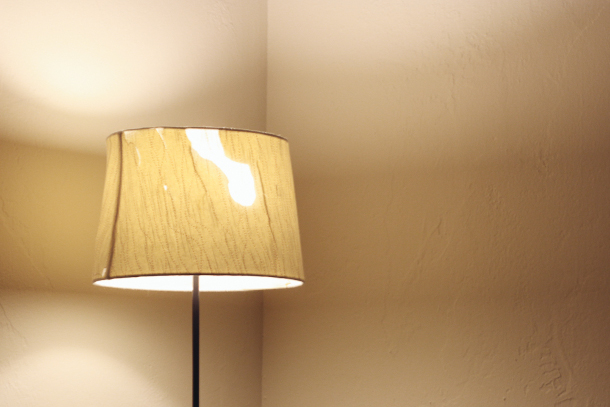
Rhode Island AFL-CIO President Patrick Crowley says that without the Solar for All program, electricity bills will continue to rise in his state. (Photo: Lex R, Flickr, CC BY-NC 2.0)
CROWLEY: Well, I think about my brothers in the Electrical Workers Union. It's local 99 here in Rhode Island. They have been doing some pretty innovative work with their apprenticeship programs. They have about a thousand members, and they had several hundred that were working solely in solar, and now all of those jobs have evaporated. You know, they're seeing layoffs for the first time in a number of years because they don't have the access to the projects that are going to be built.
CURWOOD: Okay, hey, Patrick, coming on the line with us now is Kate Sinding Daly, Senior Vice President for Law and Policy at the Conservation Law Foundation, CLF, and one of the lawyers that's representing you folks in this lawsuit. Welcome to Living on Earth as well, Kate.
DALY: Thank you, Steve, good to be with you and good to see you, Pat.
CURWOOD: So we asked you to join us to understand the legalities about this. There's one basic one, standing. Who has the right to sue in a situation like this? You weren't directly going to get any of this money.
DALY: Right, yeah, one of the things that differentiates this case from some of the other cases, where this is not the first program unfortunately, that the Trump administration has canceled, and where folks who have lost grant money have gone to court, is that the plaintiffs in this case are folks who are not the grantees directly themselves, but who would have benefited directly from the grants that were being made under the program. So for example, Pat's organization, the Rhode Island AFL-CIO, as he's described, has hundreds or thousands of workers who would have received jobs because of the grant monies that were made available. Others are homeowners who would have benefited from reduced electricity costs estimated at as much as $400 a year under the implementation of the program. And others are companies who are involved in the installation and would have been direct beneficiaries of the law.
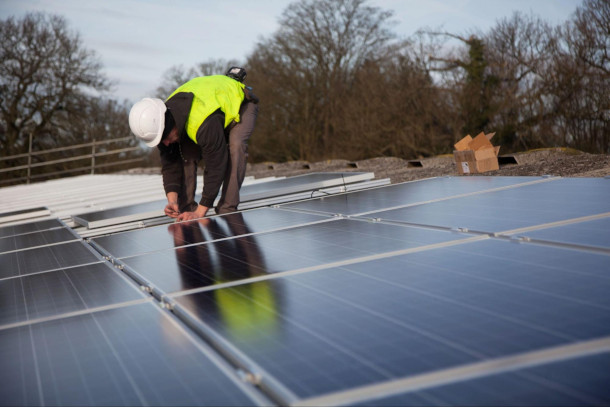
Mr. Crowley says the program would have also opened job opportunities for hundreds of Rhode Island AFL-CIO members. (Photo: Kristian Buus / 10:10, Wikimedia Commons, CC BY 2.0)
CURWOOD: So it's kind of a missing out lawsuit. How does this work in the law? How can somebody sue when something like this happens, even though they're not actually in the business that's being constrained?
DALY: Well, they are in the business, they're just not the ones who would have received the grant money. But many of these programs contemplate that there needs to be an entity that receives the grant, that enters into a contract with the federal government to receive the money, with the understanding that that entity is then going to either do re-grants or spend the money directly by hiring folks who are going to be building out the solar and connecting it to the grid. So these are folks that can demonstrate a direct financial injury as a result of the actions of the EPA in this case, and that's kind of the quintessential basis for standing as a direct financial injury.
CURWOOD: So walk us through the legal arguments here.
CROWLEY: Sure. So fundamentally, this case involves a deliberate misreading of a statute by EPA to get rid of a program that was contrary to this administration's anti-renewable energy agenda. As Pat indicated, the Solar for All program was created in the Biden administration, and was a function of the Inflation Reduction Act. Earlier this year, Congress passed something that they've euphemistically referred to as the "one big, beautiful bill" law. And that law, among other things, contains a provision that is titled, "Repeal of Greenhouse Gas Reduction Fund." And what that does is repeal a provision of the Clean Air Act that was created through the Inflation Reduction Act to develop the Solar for All program. It repeals it, and the unobligated balances of amounts made available to carry out that section are rescinded. So there's that keyword, "unobligated." That means any money that was to flow under the program that had not already been committed to grant recipients was rescinded. Doesn't apply, by its very terms, to money that had already been obligated, and nearly $7 billion had been already obligated under the Solar for All program. And so the main argument in the lawsuit is that what EPA has done is a violation of its authority under the statute, which does not authorize it to repeal or rescind funds that have already been obligated under the program.
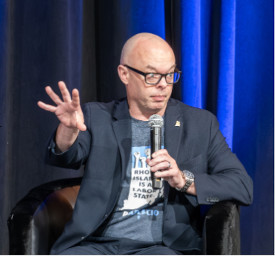
Patrick Crowley is the President of Rhode Island AFC-CIO. (Photo: RI AFL-CIO Staff)
CURWOOD: With all that in mind, where does this case stand now and what are the next steps?
DALY: Well, it's been filed, and we're waiting for the government to respond. We are seeking what's known as declaratory and injunctive relief. So we're asking the court both to declare that what EPA did here was against the law, violation both of the Administrative Procedure Act as well as of the Constitution, in violation of separation of powers, and for an injunction that the court order EPA to reinstate the program and get those monies flowing and the benefits flowing to Americans.
CURWOOD: Help us here for any precedent along these lines in some of these other cases that you've seen.
DALY: Well, what I would point to is that there's a roughly a 90% success rate for cases across the board that have challenged the illegal actions of this administration. Those aren't all environmental cases, but that's a pretty impressive win rate, and sadly, a reflection of the fact that this is an administration that does not feel beholden to the law, that seems to feel that they've got the authority to at least try to do anything that they want to do based on their ideological interests.
CURWOOD: We're on the line with Patrick Crowley as well. He's the President of the Rhode Island AFL-CIO, one of the plaintiffs in this case. And let me ask both of you, how does this lawsuit fit into the bigger picture of how President Trump's EPA is managing the rollout of Biden's Bill? Pat?
CROWLEY: Well, I think it just shows the need for everyday Americans and everyday working people like the ones I represent to be vigilant and be ready to take up the case against the administration when they work against our interests. I mean, this is not an isolated attack. We saw it very similarly in offshore wind over the summer, where the Trump administration tried to shut down a revolution wind project that my members are working on. I have a thousand people that were working on that project. It was 80% done, and they just pulled the plug on it. And again, like Kate said, we went right to court, and luckily, an injunction was instituted, and people went right back to work that very same day that the judge made their decision. So we like to say, in Rhode Island, we're a working-class state and we're a fighting state federation. We're going to take the fight to the Trump administration, wherever we think our members' rights are getting violated.
CURWOOD: Kate?

Kate Sinding Daly is the Senior Vice President for Law and Policy at the Conservation Law Foundation. (Photo: Brian Fitzgerald)
DALY: Yeah. I mean, Pat's exactly right. This is part of a pattern in practice from this administration, which has been an aggressively anti-clean energy, renewable energy from day one, including, you know, issuing an executive order on day one that said that they were going to put a stop to offshore wind. But as Pat said, those efforts haven't been successful because they've been violating the law, same way that they did here in doing that. But big picture, the clean energy transition in this country and globally is inevitable. The momentum is not reversible. Clean energy is cheaper than fossil fuels, and it's critically necessary for our public health, for the livability of this planet. So the administration is doing everything they can to try to slow us down, to try to reverse course and get us back on a fossil fuel diet. But they may be able to slow some things down. They're not going to be able to stop or reverse the momentum.
CURWOOD: And Kate, how do you think legal nonprofits such as the Conservation Law Foundation and unions and communities can work together to push back against cuts to green energy grants?
CROWLEY: This case is a great example of folks coming together, the environmental community, the labor community, average homeowners, the renewable energy industry, and saying, let's band together, because we know that this is what's good for our country. This is what's good for Americans and what's needed for a safe future for our children. That's what we're called upon to do.
CURWOOD: Pat, same question to you, how do you think legal nonprofits such as Conservation Law Foundation, communities, unions, how can they work together to push back against these cuts to green energy?
CROWLEY: Well, from our point of view, it just takes organizing, Steve. I mean, one of the things that we did here in Rhode Island a few years ago was we created an organization called Climate Jobs Rhode Island, and it is a coalition of labor unions, community organizations, environmental organizations, that are all fighting for the same cause. I mean, we believe that it's going to be the labor movement that is going to lead this charge. It's human economic activity that is driving climate change. And economic activity means work. So if work is going to be part of the equation, workers need to have their voice heard in the conversation, and that's where the labor movement comes in. So we want to make sure that is the voice for working people across the United States. We have a say in what the transition to a clean economy is going to look like, and we think that we can drive that change with the members that we represent, with the advocacy that we're engaged in, with the organizing that we're known for. We think that if we band together with our allies and our siblings across the entire community that care about the environment that we're going to make a huge difference.
CURWOOD: Patrick Crowley is the president of the Rhode Island AFL-CIO a federation of Labor unions. Kate Sinding Daly is the Senior Vice President for Law and Policy at the Conservation Law Foundation. Thank you both for taking the time with us today.
CROWLEY: Thank you, Steve. I appreciate it.
DALY: Thanks, Steve. It's been a really great conversation.
CURWOOD: The EPA declined to comment on this pending court case.
Links
The Conservation Law Foundation | “New Lawsuit Seeks to Protect $7 Billion in Solar Funding”
Read the complaint for the Solar for All lawsuit here
The New York Times | “Groups Sue E.P.A. over Canceled $7 billion for Solar Energy”
Living on Earth wants to hear from you!
Living on Earth
62 Calef Highway, Suite 212
Lee, NH 03861
Telephone: 617-287-4121
E-mail: comments@loe.org
Newsletter [Click here]
Donate to Living on Earth!
Living on Earth is an independent media program and relies entirely on contributions from listeners and institutions supporting public service. Please donate now to preserve an independent environmental voice.
NewsletterLiving on Earth offers a weekly delivery of the show's rundown to your mailbox. Sign up for our newsletter today!
 Sailors For The Sea: Be the change you want to sea.
Sailors For The Sea: Be the change you want to sea.
 The Grantham Foundation for the Protection of the Environment: Committed to protecting and improving the health of the global environment.
The Grantham Foundation for the Protection of the Environment: Committed to protecting and improving the health of the global environment.
 Contribute to Living on Earth and receive, as our gift to you, an archival print of one of Mark Seth Lender's extraordinary wildlife photographs. Follow the link to see Mark's current collection of photographs.
Contribute to Living on Earth and receive, as our gift to you, an archival print of one of Mark Seth Lender's extraordinary wildlife photographs. Follow the link to see Mark's current collection of photographs.
 Buy a signed copy of Mark Seth Lender's book Smeagull the Seagull & support Living on Earth
Buy a signed copy of Mark Seth Lender's book Smeagull the Seagull & support Living on Earth

